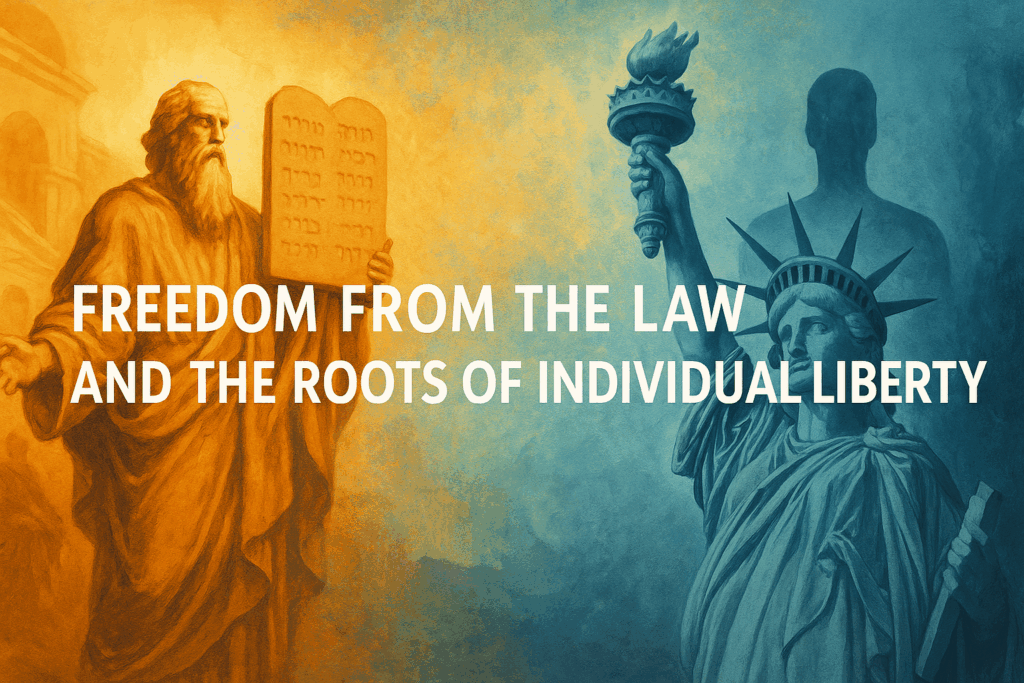One of Paul’s boldest theological contributions is his insistence that freedom in Christ liberates believers from the bondage of the Law. Far from discarding morality, this paradigm re-centers ethics not on external regulations but on the inner transformation of the Spirit and the guidance of conscience. In doing so, Paul plants the seeds of a moral revolution that shaped Western civilization: the conviction that human beings are capable of self-governance, responsible not merely to statutes but to a higher moral order. This Pauline paradigm is foundational for modern notions of conscience, civil liberty, and the primacy of love in ethical decision-making.

The Scriptural Witness
Paul frames the Law as a temporary custodian in Galatians 3:24–25: “Wherefore the law was our schoolmaster to bring us unto Christ, that we might be justified by faith. But after that faith is come, we are no longer under a schoolmaster.” The Law served a purpose in humanity’s moral infancy, restraining behavior and pointing toward Christ. Yet maturity arrives with faith, and moral life can no longer be reduced to rules. This marks the beginning of conscience as an adult faculty, rooted in Christ’s transforming work rather than external regulation.
In Romans 8:14, Paul deepens this vision: “For as many as are led by the Spirit of God, they are the sons of God.” Here, moral motivation shifts from external compliance to internal guidance by the Spirit. Obedience is no longer a matter of fear before law but the natural expression of a new filial relationship with God. The dignity of human moral agency shines here: to be guided from within is to be treated as sons, not slaves. This principle echoes in the modern conviction that people should be governed by reason and conscience, not by arbitrary coercion.
The fruits of this Spirit-led life are described in Galatians 5:22–23: “But the fruit of the Spirit is love, joy, peace, longsuffering, gentleness, goodness, faith, meekness, temperance: against such there is no law.” Paul shifts morality from the negative prohibition of wrongs to the positive flowering of virtues. Law becomes redundant where such fruits are present. This marks a decisive step toward the idea that genuine morality arises organically, not from compulsion, anticipating modern ideals of virtue ethics and character formation.
Paul also insists in Romans 13:10 that “Love worketh no ill to his neighbour: therefore love is the fulfilling of the law.” Love, not legalism, is the measure of moral action. Here Paul establishes love as the unifying principle of ethics—a foundation later echoed in secular formulations of universal benevolence, human rights, and humanitarian care. What law attempted piecemeal, love accomplishes fully.
Finally, Galatians 6:2 gives concrete expression to this ethic: “Bear ye one another’s burdens, and so fulfil the law of Christ.” Freedom from the Law does not mean an escape from responsibility but its transformation. Responsibility is now grounded in mutual care. The law of Christ is not written on tablets but enacted in compassion, solidarity, and service to others. Modern social ethics—whether in medicine, law, or civic duty—stand on this Pauline conviction that the highest moral calling is to carry the burdens of others.
The Pauline Paradigm and Modern Ethics
Paul’s teaching on freedom from the Law did more than redefine religious duty. It reoriented the very concept of morality from external compulsion to internalized conscience. This radical move laid the groundwork for the Western conviction that individuals are capable of moral self-direction, a principle enshrined in democratic governance, freedom of speech, and the right of conscience. The notion that a society could flourish when its citizens are not crushed under rigid regulation but trusted to follow a higher moral compass reflects Paul’s paradigm at work.
Moreover, Paul’s focus on love as the fulfillment of the law resonates in modern legal and ethical frameworks. Laws in democratic societies are increasingly evaluated not by their strictness but by whether they promote justice, equality, and human flourishing. The Pauline insistence that love is the true measure has found secular expression in humanitarian aid, civil rights, and even international human rights charters.
Why It Matters Today
To forget the Pauline foundation of freedom and conscience is to risk distorting freedom into mere license or reducing morality to rule-following without love. Paul’s vision reminds us that liberty must always be tethered to responsibility, and that conscience is formed not in isolation but in community, as we bear one another’s burdens. In a world increasingly fractured between legalism on one side and moral relativism on the other, Paul’s paradigm offers a path of freedom rooted in love, responsibility, and the Spirit’s renewing work.
The modern world’s confidence in liberty, conscience, and moral responsibility is not a secular invention. It is the fruit of Paul’s daring proclamation that in Christ we are free from the Law—not to indulge the flesh, but to walk by the Spirit in love. This paradigm remains the foundation of the ethical world we inhabit, and we abandon it at our peril.
Memorize The Scriptures And Doctrines From This Pauline Paradigm Here
